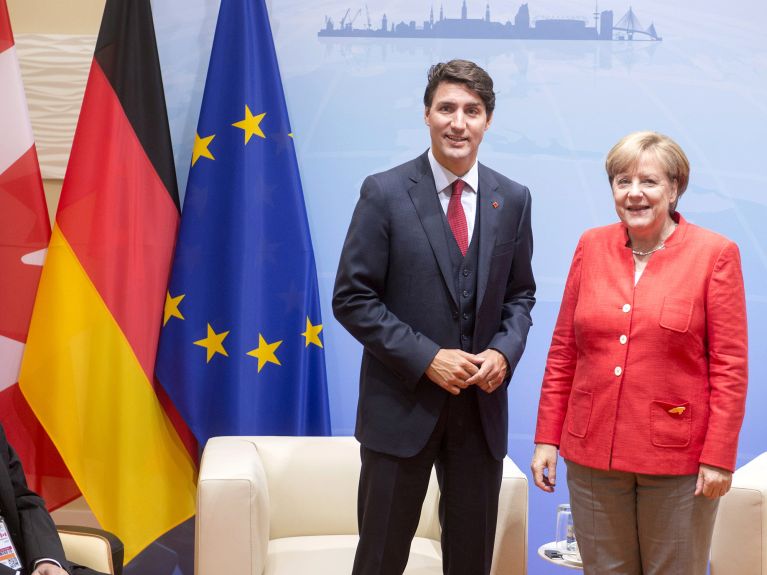Appreciated by Canadians
A new survey shows: Germany is highly regarded among Canadians, who particularly appreciate the country’s role in the refugee crisis.

It wasn‘t the usual travel warning. “Be nice, don’t gloat and buy rounds of hot chocolate”, tweeted the German Federal Foreign Office on February 23. And who was this advice dished out to? Germans in Canada. The occasion? Surprisingly, the German ice hockey team had beaten the Canadians in the Olympic semi-final. The diplomats advised their fellow countrymen to show a “high degree of empathy”: “Consider how we would feel if the Canadians had beaten us at football.” A little later, the Canadian Foreign Minister tweeted his congratulations to Germany on getting to the final, adding casually, “We remember our first gold medal match as if it were yesterday… 1920 to be exact.” Since then, Canada has won Gold nine times.
“Canada’s World Survey 2018”: top marks for Germany
This little bit of banter shows just how good German-Canadian relations are – both officially and informally. In a recently published survey of more than 1,500 Canadians, “Canada’s World Survey 2018”, Germany scored top marks: Seventeen percent of Canadians consider the country “a prominent positive force in today’s world”, which puts it in second place behind the respondents’ own country, Canada. Ten years previously, in the 2008 survey, Germany was perceived as positive by only four percent of respondents. At that time the USA was ahead, but it has since lost a lot of favor with Canadians. Now only 47 percent have an overall positive view of their powerful to the south, while just eleven percent consider it “a prominent positive force in today’s world”. That puts it in fifth place behind Canada itself, Germany, the UK and Sweden.
The lure of Berlin
“Many Canadians remember how Germany dealt with the refugee crisis”, says pollster Keith Neuman, Managing Director of the Environics Institute in Toronto, who was in charge of the survey. The spontaneous acceptance of asylum-seekers, albeit thoroughly controversial in Germany after the initial euphoria, was well received on the other side of the Atlantic – 44 percent of Canadians are first- or second-generation immigrants. They traditionally follow topics such as migration and integration with great interest, including beyond their own borders. In any case, the nation of 37 million is considered open-minded, multilingual, solidary and peace-loving, and Neuman believes Canadians also appreciate “how Germany is trying to keep the European Union together”. Among young people in particular, the popularity of Berlin as an iconic and, by international standards, affordable big city also has a positive impact. Neuman knows what he’s talking about: “One of my sons spent some time there and never wanted to leave.”
Nations linked by trade
So what does the future hold for Canadian-German relations? Neuman is hoping there will be a major survey in both countries, in cooperation with a German organization. This would give a more comprehensive overview of how relations are viewed both here and across the Atlantic. In economic terms, both countries are already have close ties: Germany is Canada’s biggest export market in Europe, and conversely Germany is one of the biggest investors in Canada. Last year the CETA free trade agreement came into force between Canada and the European Union – and now the two parties stand united against American trade tariffs.
